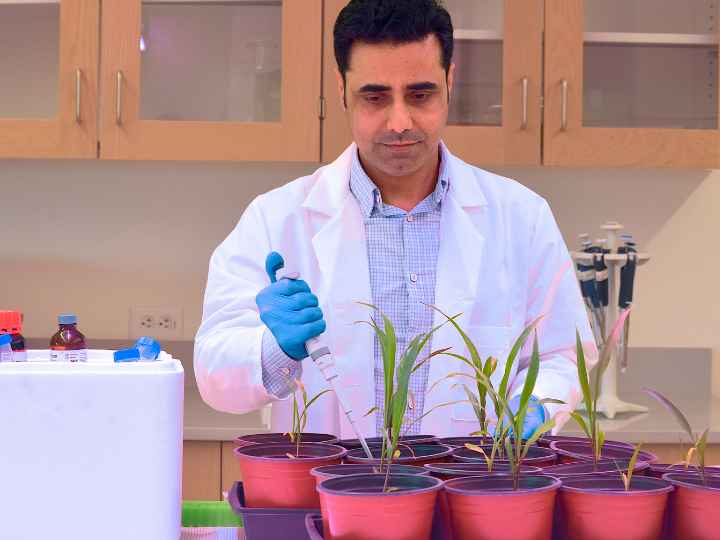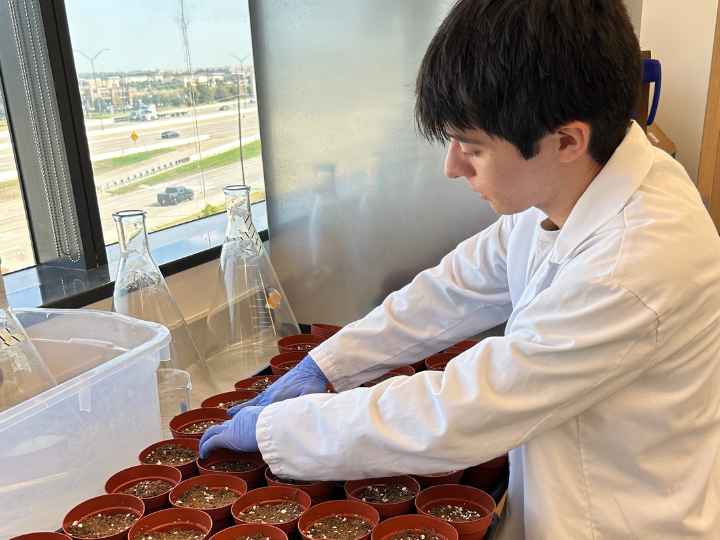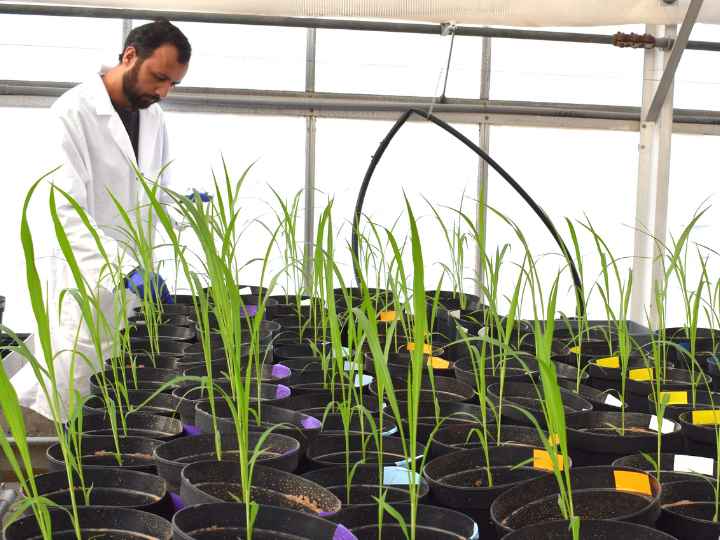Researchers at the University of Houston are training future agricultural scientists in new methods of protecting the world’s foodcrops – which too often are left vulnerable to extreme weather events in these days of climate change.

Plant biologist Abdul Latif Khan applies nutrients and microbes to sorghum plants growing in a lab at the UH Sugar Land instructional site. As the plants mature, Khan and his research team will monitor the plants’ growth progress and their tolerance to stress caused by high-saline soil.
Funded by a $995,805 grant from the U.S. Department of Agriculture, the team is expanding research knowledge and building a new curriculum for students, many from communities currently underrepresented among the agriculture industry’s leadership.
“With this new project, we hope to expand opportunities in agricultural science and increase representation by opening doors for inspired scientists of many backgrounds,” said Abdul Latif Khan, assistant professor of plant biotechnology at the UH Cullen College of Engineering’s Division of Technology. He also is the project’s principal investigator.
Frequent threats to the world’s food supply stem from weather events, such as freezes, floods, prolonged heat waves and droughts. “For example, 10 or 15 years ago, droughts lasted 10 to 14 days. But now we experience droughts of one or two months,” Khan said.
While plants can endure such harsh conditions for days, they cannot continue for weeks and months. Once they stop thriving, their growth slows and productivity diminishes. In addition, droughts and heat waves leave an indirect but lingering threat: As heat continues to evaporate moisture, salts concentrate in soil, creating a hyper-saline environment not favorable to existing crops.

These problems can hit hard as declining harvests decrease a farmer’s income. Soil that is losing its fertility becomes more costly to maintain as agricultural land. When farming the land becomes a financial burden, the owner faces a dilemma. Ultimately, the only viable option might be to sell the land for housing developments or other commercial endeavors. One by one, lost farmland contributes to global food insecurities.
“Climate change is affecting the entire earth, and it’s leaving us with less land to produce food. By the beginning of the next century, the world food demand will be almost 30% to 35% higher than what we are growing now. To reach that higher level, we will need novel tools in our agriculture system that do two things: First, safeguard the soil system. And second, not lose our farms, which future generations will need to meet food demands,” he said.
With climate change expected to spark even more extreme weather events on the planet, the need is dire for new, affordable, easy-to-use methods for farmers around the world to protect their crops. UH scientists are addressing the challenge with experiments in the Houston area.

Graduate student Waqar Ahmad checks the health of sorghum plants in a lab environment that mimics intense drought. Developing food crops resilient to harsh conditions is critical to assuring adequate food supplies will be available for future generations.
“In our ongoing research, the overall objective is to improve plant growth and build plants’ resistance against climate change. We’re exploring two approaches. One is to adopt naturally relevant systems, the other involves synthetic biology or genetic engineering approaches to producing food,” he said.
Research into climate-change effects on food crops is ongoing. By involving undergraduate and graduate students in the studies, researchers will share knowledge and new skills in food production and climate change biology. The new project activities will be initiated in February 2024.
Joining Khan as co-investigators are, from UH: Venkatesh Balan, associate professor of biotechnology; Yuheng Lin, assistant professor of biotechnology; Hyunseok Hwang, assistant professor of sociology; and Albert Flavier, instructional professor of biotechnology. Also joining the research team is Shuyang Zhen, of Texas A&M University.